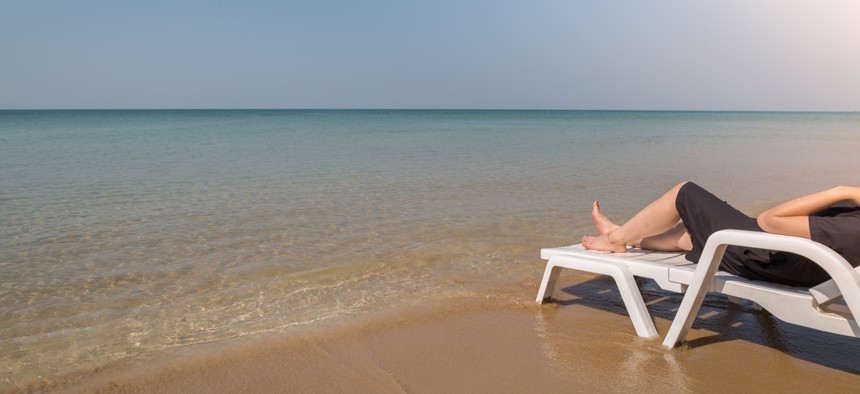
Shutterstock.com
The Transformative Power of Doing Absolutely Nothing
Make time for "isness," the opposite of "oughtness."
On a recent Sunday, I found myself overwhelmed. It was my last free day between several consecutive weekends of travel, visitors, and weddings. The morning had ticked away, and my boyfriend and I had groceries to buy, paperwork to file, a house to tidy, and something to do at Home Depot. As I contemplated how to productively use the afternoon, my chest tightened. I stepped outside for a gulp of fresh air. There, an idea struck.
“Let’s go to the beach for two hours,” I said. “Then we can do our stuff.”
I was still feeling stressed while I packed my bag, and even while we sought out a spot on the sand. But eventually—maybe when I spotted some dolphins past the breakers, or dunked into a cold, oncoming wave—the stress dissipated. I didn’t do much reading at the beach, or really much of anything. I mostly stared at the water, got wet, laid on a warm blanket, then moved to a chair. After two hours, we folded up our blanket, drove home, and divided and conquered our tasks for the rest of the afternoon. And you know what? They weren’t so painful. It was actually kind of pleasant to surrender to the rhythm of paperwork, while the sun sank lower in the window.
Afterwards, I tried to put my finger on what made this couple of hours at the beach so transformative. I described the Sunday-saving victory of having carved out time for enjoyment—with no ulterior motive—to my colleague at Quartz, Ephrat Livni, who lives in a cabin in the California redwoods and has studied Zen Buddhism.
“Isness,” she said. Isness?
Isness, Livni explained, appears in a variety of writings about religion and spirituality, but the concept also has a place in the secular world. “Doing the thing for what it is—not for what it delivers,” she told me, “is kind of a cultivated habit.”
What Livni calls “isness,” Quartz’s Olivia Goldhill—who recently wrote about the practice’s psychological benefits—simply calls “wasting time.” We all call it necessary. Here are some ways to cultivate the habit.
Make time for it
As Goldhill wrote, “work expands to fill the time it’s given.” So try giving yourself a little less time to do it—say, by setting a timer to finish a task. It might seem counterintuitive to schedule an hour to “waste,” but if we waited until we felt we had extra time to spare, it would never happen.
Shake off your sense of obligation
Merriam Webster contrasts “isness” with “oughtness”—”the state of being morally obligatory.” As Goldhill wrote, that sense can rob even one’s favorite activities of joy. So rather than telling yourself you really ought to see that exhibit before it closes, remind yourself of why it’s something that you truly want to do. (And if you find that you truly don’t, well, maybe don’t.)
Choose activities with no moral imperative
That’s a fancy way of saying, “Do something just because you feel like it.” Lay down in the grass for 20 minutes; bake cookies for no one in particular; go for a walk without a destination; hug your kid because it feels good. Those activities might well have additional benefits, but they’re also great just for what they are.
Pay attention to the natural world—and expose yourself to it
No need for a major expedition. Check what time the sun will set, and make a point of being outside and looking at it. If the sky is clear, you might also catch the Eta Aquarids meteor shower—some remnants from our old friend Halley’s Comet—in the eastern sky. This is also a great month to plant seeds or starters to tend into the spring and summer. If you don’t have outdoor space, just try some herbs on a windowsill.
Keep it up
Ever since that Sunday, I’ve tried to let isness permeate other parts of my life. That involves trying to enjoy everyday activities—whether I’m folding laundry or transcribing an interview—for what they are, indulging in their pleasures, rather than treating them as chores. You might think of it as approaching life like a child (or an optimistic stoner). This week, on a visit to New York, my challenge has been to appreciate a daily F-train subway commute as a wacky adventure, rather than a grueling necessity. (Not always easy!)
I’m pretty sure this isn’t far off from the increasingly popular state known as “mindfulness.” While I’ve surely rolled my eyes at the “mindfulness industrial complex,” there’s value in the pursuit itself—and I feel happier when I can cultivate it. If this sounds appealing, the 1991 book Peace is Every Step, by the Zen monk Thich Nhat Hanh, is a great beginner’s manual.






